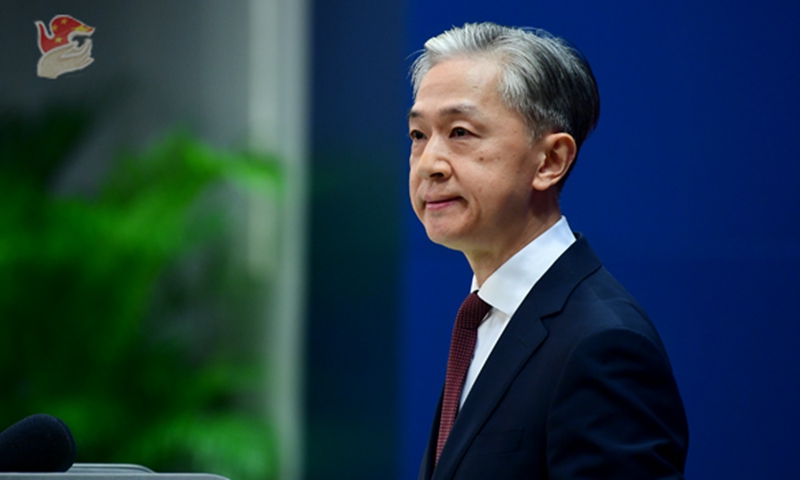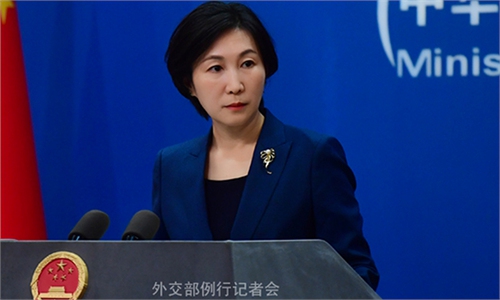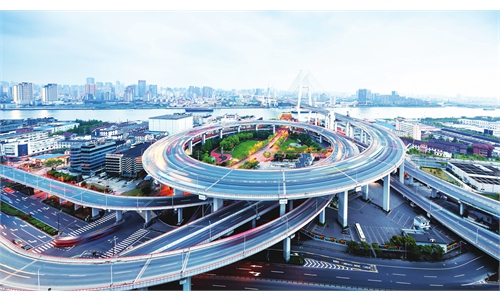
Foreign Ministry Spokesperson Wang Wenbin Photo: Chinese Foreign Ministry
It's not up to the US to decide whether China is a developing country. The US can neither deny the fact that China is still a developing country, nor stop China from moving toward national rejuvenation. Rather than try to figure out how to pin the label of "developed country" on China, the US might want to think about how to remove its own label of a bully and hegemon, the Chinese foreign ministry said on Friday.
The comment came after a key US Senate committee approved the "Ending China's Developing Nation Status Act" on Thursday, backing a similar bill unanimously passed by the US House of Representatives in March. The bill will seek to change China's status as a developing country in international organizations.
"The US is not labeling China a 'developed country' out of appreciation or recognition for China's development success. The real motive behind ending China's developing country status is to hold back China's development," Wang Wenbin, a spokesperson of the Ministry of Foreign Affairs, said on Friday during a regular press conference.
China's status as the world's largest developing country is rooted in facts and international law. It's not something that can easily be wiped away by a US Congressional bill, Wang stressed. He added that the rights that China is lawfully entitled to as a developing country will not be deprived just because a few politicians on the Hill say so.
China is still not classified as a developed country under the criteria of most organizations. China's per capita GDP still lags behind that of developed countries. The metric is used to measure the status of developing and developed countries by major international organizations.
Taking World Bank data for 2022 as an example, China's per capita GDP ($12,556.3) is only 18.6 percent that of the US ($68,774), 30 percent that of Japan ($42,676), 24.9 percent that of Germany ($51,464), 28.5 percent that of France ($44,954), and 28.9 percent that of the UK ($44,362).
The US' move aims to deprive China of the rights it should enjoy as a developing country in some international organizations and treaties, Tian Yun, a macroeconomic observer, told the Global Times on Friday.
"But for the US, it is more important to deprive China of its representation in developing countries and cut off the broad and deep connection between China and developing countries," Tian noted.
The US is trying to hollow out the foundation of China's relations with other developing countries and isolate China, Li Yong, deputy chair of the expert committee of the China Association of International Trade, told the Global Times on Friday.
Li said that by denying China's status as a developing country, the US is trying to weaken China's legitimacy in representing the common interests of developing countries in international institutions.
"As a developing country, China understands the development challenges and unfair treatment faced by developing countries, and is committed to fighting for the fair and just development interests of developing countries, and does its best to help developing countries in the fields of economy, technology and investment, which is welcomed and supported by developing countries," Li noted.
The foreign ministry spokesperson also stressed that China's contribution to global economic growth and UN regular budget and peacekeeping assessments far outweighs that of most developed countries.
"According to some US lawmakers, there is concern that China would use its developing country status to evade international responsibilities. That is completely unnecessary," said Wang.
In fact, from 2013 to 2021, China's average contribution to world economic growth was 38.6 percent, higher than the G7 countries combined. China has contributed more than 70 percent to global poverty reduction.
Analysts also pointed out that the move is a typical example of the US' consistent hegemonism, which maliciously challenges the international order, adding that the purpose of containing China is very obvious.
The containment of China by the US is comprehensive, including the blockade of science and technology and the blockade of industrial chains. The US "trick" of stripping China of its "developing country" label is just a small part of its containment, but one that is played again and again, ever since China applied for access to the WTO, Hu Qimu, deputy secretary general of the digital real economies integration Forum 50, told the Global Times on Friday.
"If a country with 1.4 billion people can be brought to a high-income level through modernization in a Chinese style, the demonstration effect on the world will be very strong. It brings confidence to the development of developing countries, so that other developing countries no longer have to rely on the industrial chain of developed countries," said Hu.



